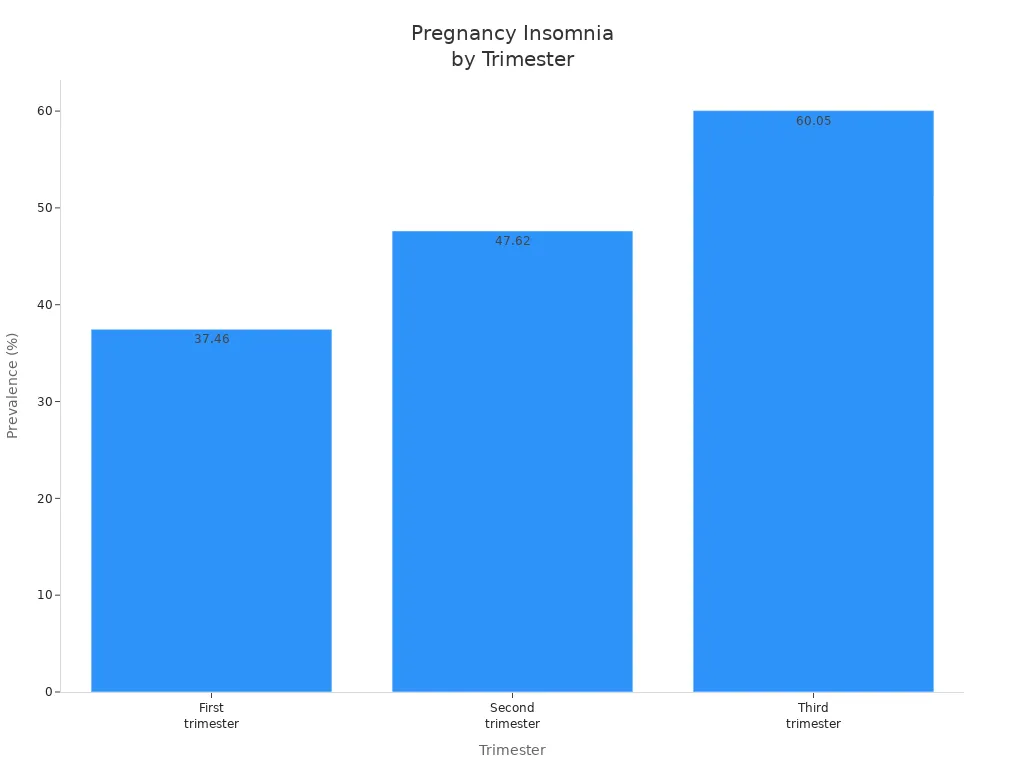If you find it difficult to sleep well at night, you are certainly not alone. Many expectant mothers experience trouble sleeping during pregnancy.
Research indicates that up to 60% of women suffer from poor sleep quality in the third trimester. Sleep disturbances can begin as early as the first trimester and often worsen as the pregnancy progresses.
The table below illustrates how sleep quality changes throughout pregnancy:
| Trimester | Pooled Prevalence of Poor Sleep Quality (%) | 95% Confidence Interval |
|---|---|---|
| First trimester | 37.46 | 29.26 to 45.67 |
| Second trimester | 47.62 | 42.23 to 53.02 |
| Third trimester | 60.05 | 48.70 to 66.62 |

There are many reasons why your sleep may change during pregnancy, including hormonal fluctuations, physical discomfort, or feelings of anxiety.
The encouraging news is that pregnancy insomnia home remedies can significantly improve your rest. Always bear in mind that if you continue to struggle with sleep or feel concerned, your midwife or GP is there to support you.
Key Takeaways
- Make a calm and regular bedtime routine. This tells your body it is time to sleep. It can help you sleep better.
- Try not to use screens before bed. Blue light from screens can stop your body making melatonin. This can make it hard for you and your baby to sleep.
- Try deep breathing, prenatal yoga, or mindfulness. These can help you relax and feel less worried. You may sleep better if you are calm.
- Change what you eat and drink at night. Do not have caffeine late in the day. Eat small, healthy snacks. Drink less in the evening so you do not wake up at night.
- Make your bedroom comfy. Keep it cool and dark. Use pillows that help your body. Try to fix any pregnancy aches so you can rest well.
1. Bedtime Routine
Calming Activities
You can help your body and mind get ready for sleep by building a calming bedtime routine. Try simple activities that make you feel relaxed.
Many mums find that reading a gentle book, listening to soft music, or taking a warm bath helps them unwind. Meditation and breathing exercises can also calm your thoughts and lower stress.
Some women like to write down their worries before bed, which clears the mind and makes it easier to drift off.
- Take a warm bath to ease tired muscles.
- Enjoy a soothing cup of herbal tea (make sure it’s safe for pregnancy).
- Read a favourite book.
- Listen to relaxing music or a guided meditation.
- Write down your thoughts or worries.
- Massage your feet or legs.
Tip: Dimming the lights and turning off screens at least an hour before bed can help your body produce melatonin, the hormone that makes you sleepy.
These calming activities signal to your body that it’s time to slow down. They help reduce tension and prepare you for a deeper, more restful sleep. Many pregnancy insomnia home remedies start with a peaceful bedtime ritual.
Consistency
Going to bed and waking up at the same time every day can make a big difference. Your body loves routine. When you keep a regular sleep schedule, you train your internal clock to know when it’s time to rest. This makes it easier to fall asleep and wake up feeling refreshed.
- Stick to the same bedtime, even on weekends.
- Wake up at the same time each morning.
- Avoid napping late in the day.
Note: Studies show that poor sleep hygiene, like irregular sleep times or watching TV in bed, is linked to worse sleep in pregnancy. Simple changes to your routine can help you sleep better and feel better.
A consistent bedtime routine is one of the safest and most effective pregnancy insomnia home remedies. It’s a gentle way to support your health and your baby’s well being.
2. Limit Screen Time
Reduce Evening Use
You probably reach for your phone or tablet in the evening. It feels relaxing to scroll through social media or watch a show before bed. But using screens late at night can make it harder for you to fall asleep.
Your brain stays active, and you might find it difficult to switch off. Try to put your devices away at least an hour before bedtime. This gives your mind a chance to wind down.
Here are some easy ways to cut back on screen time in the evening:
- Set a reminder to turn off your phone or tablet after dinner.
- Swap your screen for a book or magazine.
- Listen to calming music or a podcast instead of watching TV.
- Charge your devices outside the bedroom.
Tip: Keeping your bedroom a screen free zone helps your brain link that space with rest and sleep.
Some studies show that artificial light at night, including from screens, can affect your sleep quality. However, not all research finds a direct link between screen time and sleep problems in pregnancy. Even so, many mums notice they sleep better when they use screens less before bed.
Blue Light Effects
Screens give off blue light, which can trick your body into thinking it’s still daytime. Blue light stops your body from making melatonin, the hormone that helps you feel sleepy. When melatonin drops, you might find it takes longer to drift off, and your sleep may not feel as deep.
During pregnancy, melatonin does more than help you sleep. It supports your baby’s development and helps set their own sleep patterns. If blue light lowers your melatonin, it could affect both you and your baby. Experts say that too much blue light in the evening can lead to poor sleep, higher pain during labour, and even raise the risk of gestational diabetes.
A recent study found that pregnant women who wore blue blocking glasses in the evening had higher melatonin levels and fell asleep faster. You can try blue light filters on your devices or wear special glasses to block blue light. These small changes can help you protect your sleep and support your baby’s health.
3. Relaxation Techniques
Struggling to switch off at night? You’re not alone. Many mums to be find that relaxation techniques make a real difference. These simple methods help calm your mind and body, making it easier to drift off.
Breathing
Deep breathing is a powerful tool. It slows your heart rate and helps you feel less anxious. Try this easy exercise:
- Sit or lie down comfortably.
- Close your eyes and breathe in slowly through your nose for four counts.
- Hold your breath for four counts.
- Breathe out gently through your mouth for six counts.
- Repeat for five minutes.
You can also try progressive muscle relaxation. Tense and relax each muscle group, starting at your toes and moving up to your head. Studies show this technique lowers stress and helps you sleep better. Guided imagery, where you picture a peaceful scene, can also help your mind let go of worries.
Tip: Practise these exercises before bed or if you wake up during the night.
Prenatal Yoga
Prenatal yoga combines gentle stretches, breathing, and relaxation. You don’t need to be flexible or have yoga experience. Many mums say they feel calmer and sleep more soundly after a short session.
Research shows that prenatal yoga reduces stress, anxiety, and even depression. One study found that women who did yoga four times in two weeks slept much better in the third trimester.
- Join a local class or try online videos made for pregnancy.
- Focus on slow movements and deep breathing.
- Always listen to your body and stop if anything feels uncomfortable.
Mindfulness
Mindfulness means paying attention to the present moment. It helps you notice your thoughts and feelings without judging them.
This can stop your mind from racing at bedtime. You might try a short meditation, listen to a mindfulness app, or simply focus on your breath.
- Set aside five minutes each evening.
- Sit quietly and notice your breath or the sounds around you.
- If your mind wanders, gently bring it back.
Many mums find that mindfulness helps them feel more relaxed and ready for sleep. Relaxation techniques are safe, easy, and cost nothing. They’re a gentle way to support your well being during pregnancy.
4. Food and Drink
What you eat and drink in the evening can make a big difference to your sleep. Let’s look at some simple changes you can try tonight.
Avoid Caffeine
Caffeine hides in more than just coffee. You’ll find it in tea, chocolate, cola, and even some medicines. Caffeine acts as a stimulant.
It keeps your brain alert and can make it harder for you to fall asleep. During pregnancy, your body takes longer to break down caffeine, so its effects last even longer.
- Caffeine can interfere with falling asleep and may cause you to wake up during the night.
- Some people feel the effects of caffeine more than others. Your genes and how much caffeine you usually drink play a role.
- Experts recommend keeping your caffeine intake below 200 mg per day when you’re pregnant. That’s about one mug of coffee or two cups of tea.
Tip: Try switching to herbal teas or warm milk in the evening. Always check that your chosen herbal tea is safe for pregnancy.
Light Snacks
Going to bed hungry can keep you awake, but a heavy meal might make you uncomfortable. A small, healthy snack before bed can help you sleep better. Choose snacks that combine protein, healthy fats, and slow release carbs.
- Dried tart cherries (natural melatonin)
- Greek yoghurt with berries and walnuts
- Cottage cheese with fruit and granola
- Almonds or a handful of mixed nuts
- Avocado on whole grain toast
- Celery sticks with peanut butter
- Hard boiled eggs
These snacks help keep your blood sugar steady through the night. Try different options to see what works best for you.
Evening Fluids
Staying hydrated is important, but drinking too much close to bedtime can mean extra trips to the loo. This can interrupt your sleep. Try to drink most of your fluids earlier in the day. In the evening, sip water slowly and avoid sugary drinks.
Note: If you often wake up thirsty, keep a small glass of water by your bed.
Making small changes to your food and drink habits can help you get the rest you need. These tips fit well with other pregnancy insomnia home remedies.
5. Sleep Environment
Comfort
You spend a lot of time in your bedroom, so it makes sense to make it as cosy as possible. A comfortable sleep environment can help you relax and drift off more easily. Start by checking your room temperature. Most mums sleep best when the room stays between 20°C and 25°C.
If you feel too hot or too cold, you might wake up during the night. Try using a fan or opening a window for fresh air. Heavy curtains or blinds can block out street noise and keep your room quiet. Some mums like to use a white noise machine or earplugs to block out sounds from outside.
Here are some quick tips for a comfy sleep space:
- Keep your room cool, between 20°C and 25°C.
- Use blackout curtains to block light and noise.
- Try a humidifier to keep the air moist, especially in winter.
- Choose soft, breathable bedding.
Tip: A quiet, dark, and cool room helps your body relax and supports better sleep.
Pillows
Pillows can make a huge difference when you’re pregnant. You might notice aches in your back, hips, or neck as your bump grows. Special pregnancy pillows help by supporting your belly and keeping your body in a good position.
Many mums find that sleeping on their left side feels safest and most comfortable. A pillow between your knees can ease pressure on your hips. You can also tuck a pillow behind your back or under your bump for extra support.
- Pregnancy pillows help align your spine and reduce pain in your back, hips, and pelvis.
- They support your belly and stop it from pulling downwards.
- You can start using them as soon as sleep feels uncomfortable, but they become even more helpful in the second and third trimesters.
Note: Good posture in bed can help you wake up feeling less stiff and sore.
Darkness
Light can trick your brain into thinking it’s time to wake up. Darkness tells your body to make melatonin, the hormone that helps you sleep.
Try blackout curtains or an eye mask to keep your room dark. If you need to get up at night, use a dim nightlight instead of turning on the main light. This helps you fall back asleep more quickly.
- Blackout curtains or blinds keep your room dark.
- Eye masks work well if you can’t block all the light.
- Dim lighting at night supports your natural sleep cycle.
A peaceful sleep environment is one of the easiest ways to improve your rest during pregnancy. Small changes can make a big difference in how you feel each morning.
6. Manage Discomfort
Pregnancy brings many changes to your body, and some of these can make it tough to get a good night’s sleep. Let’s look at the most common discomforts and how you can manage them.
Heartburn
Heartburn is a burning feeling in your chest or throat. It often gets worse at night. You might notice it after eating spicy or fatty foods. To ease heartburn, try these tips:
- Eat smaller meals and avoid eating close to bedtime.
- Stay upright for at least an hour after eating.
- Raise the head of your bed or use extra pillows to keep your upper body higher.
- Choose gentle foods like bananas, oats, or yoghurt.
Note: If heartburn keeps you awake, speak to your midwife or GP. They may suggest safe medicines like omeprazole.
Leg Cramps
Leg cramps can wake you up suddenly with sharp pain, often in your calves or feet. They are common in pregnancy, especially at night. Here’s what you can do:
- Stretch your legs before bed.
- Massage your calves or soak your feet in warm water.
- Stay active during the day with gentle walks.
- Drink enough water, but avoid too much right before bed.
Some mums find that magnesium helps, but research is still unclear. Always check with your healthcare provider before taking supplements.
Sleep Position
The way you sleep can make a big difference. As your bump grows, side sleeping becomes the best choice. Experts recommend sleeping on your left side. This helps blood flow to your baby and supports your kidneys. Try these tips for comfort:
- Place a pillow between your knees.
- Use a pillow under your bump and behind your back.
- Avoid sleeping on your back, as it can cause back pain and make you feel dizzy.
Here’s a quick table to show common discomforts and how to manage them:
| Discomfort | What Helps? |
|---|---|
| Back or joint pain | Pillows, massage, gentle stretching |
| Heartburn | Raised upper body, small meals, safe medicine |
| Leg cramps | Stretching, massage, warm baths |
| Restless legs | Iron, gentle movement, relaxation |
Tip: If you wake up on your back, just roll onto your side and get comfy again.
7. Natural Remedies
Do you want gentle ways to help you sleep? Many mums use natural options as part of their pregnancy insomnia home remedies. Here are some popular choices and safety tips you should know.
Herbal Teas
Chamomile tea is known for helping people relax before bed. Many pregnant women drink it for sleep or anxiety. But scientists are not sure if it is safe.
Some studies say chamomile tea might raise the risk of early birth or low birth weight. There is no proof it helps sleep during pregnancy. Chamomile can also cause allergies or react with medicines. Herbal teas are not always checked for safety, so their strength can change.
Note: Always ask your midwife or GP before trying herbal teas. If you get a rash, swelling, or trouble breathing, stop using it and get medical help.
Aromatherapy
Aromatherapy uses special oils to make a calm feeling. Lavender oil is a favourite for sleep and is safe in pregnancy if used right. You can put a few drops in a diffuser or smell it before bed.
Oils like rosemary, sage, jasmine, and peppermint are not safe for pregnant women. Some can cause contractions or skin problems.
- Only use lavender or lemon balm oils.
- Always mix oils with another oil (0.5%-1%).
- Do not put oils straight on your skin, especially in the first trimester.
Tip: Always check with a healthcare provider or trained aromatherapist before using any essential oils.
Magnesium
Magnesium helps your muscles relax and helps your baby grow. It may also help you sleep better and stop cramps. Pregnant women need 350-400 mg each day from food and supplements.
Magnesium glycinate is a good type because your body uses it well. Take magnesium in the evening with food for best results.
| Benefit | Details |
|---|---|
| Sleep support | Calms nerves, may help you sleep better |
| Muscle cramp relief | Eases leg cramps at night |
| Safety | Safe if you follow your doctor’s advice |
Note: Do not take extra magnesium without checking with your midwife or GP. Too much can cause diarrhoea or other side effects.
Natural options can be a gentle part of your pregnancy insomnia home remedies, but always put safety first.
Pregnancy Insomnia Home Remedies Tips
Sleep Hygiene
Good sleep hygiene can make a big difference when you are pregnant. You might notice that sleep problems start early and can last throughout pregnancy. Experts say that looking after your sleep is just as important as eating well or staying active.
Here are some simple habits you can try:
- Stick to a regular bedtime and wake up time.
- Keep your bedroom cool, dark, and quiet.
- Use your bed only for sleep and rest.
- Avoid heavy meals and caffeine close to bedtime.
- Try a relaxing routine before bed, like reading or gentle stretching.
Did you know? Getting at least 7 hours of sleep each night can lower your risk of gestational diabetes and help you feel more energised.
You do not have to put up with poor sleep. Ask your midwife for advice if you need extra support. Many women find that learning about sleep hygiene helps them feel more in control.
Limit Naps
Napping during the day can help you feel less tired, but long naps might make it harder to sleep at night. Short naps, under an hour, can boost your energy and improve how you feel, especially in the second trimester. Try to keep naps brief and avoid sleeping too late in the day.
| Nap Length | Nighttime Sleep Quality |
|---|---|
| Less than 1 hour | May help you sleep better |
| 1 hour or longer | Can make night sleep worse |
If you feel sleepy, a quick nap is fine. Just remember, long naps could disrupt your sleep later.
Light Exercise
Moving your body each day can help you sleep better and feel happier. Safe exercises for pregnancy include walking, swimming, and gentle yoga.
Aim for about 150 minutes of moderate activity each week, but start slow if you are new to exercise. Even a short walk after dinner can help you relax and get ready for bed.
- Walking and swimming are gentle and safe.
- Yoga and Pilates can ease aches and calm your mind.
- Always listen to your body and drink plenty of water.
Tip: Regular light exercise can reduce stress, improve your mood, and support healthy sleep. It is a key part of pregnancy insomnia home remedies.
These pregnancy insomnia home remedies can really help you feel better. They make it easier to sleep and wake up feeling rested.
- Having help from your family or partner can really help you.
- Lots of mums have trouble sleeping or finding a comfortable way to lie down.
- If you still cannot sleep well, talk to your healthcare provider. They might suggest things like yoga, massage, or cognitive behavioural therapy instead of medicine.
Remember, looking after yourself and being patient is important. You should have good sleep and support while you are pregnant.
FAQ
Can I use over the counter sleep aids during pregnancy?
You should not use over the counter sleep aids unless your doctor says it is safe. Many sleep medicines are not safe for your baby. Always check with your midwife or GP before taking any new medicine.
How many hours of sleep do I need while pregnant?
Most pregnant women need about 7 to 9 hours of sleep each night. Your body works hard to support your baby. If you feel tired, try to rest more during the day.
Is it normal to wake up often at night?
Yes, it is very common. You may wake up to use the toilet, feel discomfort, or have vivid dreams. Try the tips in this blog to help you get back to sleep more easily.
Are herbal teas safe for pregnancy insomnia?
Some herbal teas, like chamomile, may not be safe for everyone. Always ask your midwife or GP before trying any herbal tea. Some herbs can cause allergies or affect your pregnancy.
What should I do if I still cannot sleep?
If you still struggle with sleep after trying these remedies, speak to your healthcare provider. They can check for other problems and suggest safe treatments. You do not have to manage insomnia alone.



